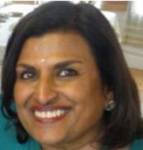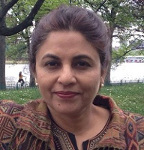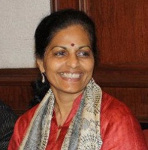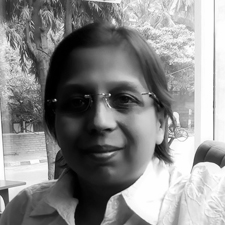TRUSTEES

Prof. Nalini K Rao, M.A, M.Phil
Chairperson, Board of Trustees, IIACD
Director, Centre for Cultural Heritage and Tourism Studies (CHATS)
Prof. Nalini K. Rao is a senior academic specialized in heritage and tourism studies, with vast experience in developing equitable and sustainable tourism plans and over 50 publications in national and international journals and several book chapters. She has authored three books on the art and culture of “Ladakh”, “Ladakh and Mustang”, “Himalayan Desert”, published by Roli Press. She was Head of the Department of Tourism, University of Delhi. She also taught at the College of Vocational Studies, and was visiting professor at Centre for Jawaharlal Nehru Studies, Jamia Milia Islamia University. She served on the Board of Equations (Equitable Tourism Options), Bangalore and has made Tourism Plans for several states in India including Kerala, Ujjain, Himachal, Leh, Kullu Manali Valley with INTACH. As a Guest Faculty in the Dept. of Conservation, School of Planning and Architecture, Delhi, she teaches a course on cultural tourism and serves as a Guide for students in the final semester studio class on site development plans, mapping, design, restoration of processes and on the use of materials and application of theories of conservation to heritage buildings, arts, crafts and architecture. Prof. Rao researched Shekawati painted houses in Rajasthan while leading a project on Tourism and Representation: The Dalit Perspective- Case Study of Nawalgarh, Shekhawati, Rajasthan. Prof. Rao is co-PI of the IDH: Vijayanagara Murals project funded by DST, GoI at IIACD with Prof. Vijay Chandru (PI).

Prof. Vijay Chandru, PhD
Founder - Trustee, IIACD
Hon. Director, Center for Health Ecologies and Technology (CHET)
Prof. Vijay Chandru (PhD, Massachusetts Institute of Technology) has three decades of academic experience in digital technologies and computer science research at Purdue University and the Indian Institute of Science. He is a fellow of the Indian Academies of Science and Engineering. As co-convenor of the Perceptual Computing Laboratory (PerCoLat) at IISc for a decade (1995-2005), he participated in semantic web language development, in advances in visualization for scientific data and in development of the Simputer. Vijay is a recipient of several national and international awards including UGC’s Hari Om Trust award for contributions to science and society in 2003. He co-founded Strand Genomics (2000). Given his patient advocacy interests in rare/orphan genetic diseases, in 2014, Vijay co-founded the Organization for Rare Diseases in India (ORDI), which was incubated at IIACD. He leads the Medical Humanities and Bioethics Initiative at CHET. Vijay also heads the Digital Heritage technology team at IIACD that is building the Knowledge Bank which will serve as a repository of knowledge generated by over 20 art, cultural and technology institutions that have been working on the unique cross disciplinary multi-institutional Indian Digital Heritage (IDH) initiative supported by the Department of Science and Technology, Government of India, with a focus on Hampi.

Ambassador V. Latha Reddy, IFS
Member, Board of Trustees, IIACD
Cultural Ambassador
Ambassador V. Latha Reddy is the former Deputy National Security Adviser of India. She joined the Indian Foreign Service in 1975 and has served on diplomatic assignments in Lisbon, Brasilia, and as Consul general in Durban and Deputy Chief of Mission in Vienna. Ms Reddy served as Ambassador of India to Portugal from 2004 to 2006 and to the Kingdom of Thailand from 2007 to 2009. Originally trained in English Literature, Ambassador Reddy has had a deep involvement in Indian Cultural Studies and has also held the post of the Deputy Director General of the Indian Council for Cultural Relations in India. She currently serves as a Chairperson of the Deccan Heritage Foundation, India.

Ranjana Ramchander
Member, Board of Trustees, IIACD
Faculty of Arts
Ranjana Ramchander was born in Pune, India, where she spent the first 20 years of her life. She studied Drawing and painting at the Abhinav Kala Mahavidyalaya and Sir J.J. School of art,Mumbai, India. She has held independent shows at Chitrakala Parishat and Alliance Francaise in Bangalore, Jamnalal Bajaj Art Gallery in Mumbai, and Art Forum in Singapore. She has worked with the French artist, Christian Puard on the ancient technique of Tempura painting, a technique she uses considerably in her new series of paintings.
Along with her husband Late Shri. Ramchander, Ranjana founded the Hemophilia Society Bangalore Chapter in 1992. The society has undertaken awareness programs at all levels and made the first animation film on hemophilia. As the General Secretary (from 2000-2013), Ranjana successfully advocated with the Govt of Karnataka to include Hemophilia in the,"Prevention of Disability Act" and hence provide free factor treatment (which is very expensive) through designated Govt hospitals throughout the state since 2005. She also served as Executive Committee member on the board of Hemophilia Federation, New Delhi and Vice Chairperson of Society for Hemophilia care, New Delhi.

Prof. Uma V Chandru, MEd, M.S
Founder - Trustee and Director, IIACD
Faculty of Digital Heritage and Humanities
Uma’s multidisciplinary background includes an undergraduate degree in Nutrition and Dietetics (BSc) with a minor in Education from Women’s Christian College, Chennai, an MEd. from Lesley University in Special Education and an M.S from Purdue University, USA in Environmental Design and all but dissertation towards a doctoral degree in Cultural Anthropology at Purdue University where she was awarded a Doctoral Fellowship. Teaching experience includes: Design and Anthropology fundamentals at Purdue University, USA. As a faculty member of Srishti School of Art, Design and Technology, Bangalore, Uma designed curriculum and taught Ethnographic Research, Design Research methods, Art and Design Law, Future of Craft and various other courses and labs for art, film and design students. She has guest lectured at postgraduate design and management institutes in Bangalore. As a Rockefeller Fellow at the Center for Folklife and Cultural Heritage (CFCH) at Smithsonian Institution (Fall 2007), she researched and reflected upon grounded and democratic policy and practices in the craft sector that empower and enable sustainable livelihoods of indigenous crafts communities in cultural and heritage tourism sites in India, without endangering human rights and community rights to equitable benefits from their tangible and intangible heritage. Uma co-founded the International Institute for Art, Culture and Democracy (IIACD) and heads the Heritage Arts Initiative (HAI) and Heritage and Youth (HAY) Programme at the Centre for Cultural Heritage and Tourism Studies. She is the Coordinator of the IDH Vijayanagara Murals project (2011-2015). Prior research and advocacy include: a comparative study of dry and wet Karnataka villages, gendered spaces in government housing and vernacular architecture in rural Karnataka, gender dynamics in rural household decision making, safeguarding intangible heritage of craftspeople, problems with geographical indicators in crafts communities, rights of indigenous people, sustainability of potters livelihoods, cultural tourism, cultural democracy, heritage arts, engaging community youth in cultural heritage, autism, rural healthcare.

Dr. Namitha A Kumar, PhD
Member, Board of Trustees, IIACD
Namitha's interest in rare diseases began in 2014 when she interacted with a person with Juvenile Huntington's disease in Mumbai. She was deeply impacted by the fact that the disease had no approved treatment or cure and led to degeneration and disability. Namitha's interest led to a talk on Huntington's disease at the National Institute of Advanced Studies where she was doing a PhD in cognitive psychology. The talk led to a chance meeting with Prof. Vijay Chandru who was spearheading multiple initiatives in rare diseases. After Namitha's PhD in 2015, she joined the Centre for Health Education and Technology where she engaged in care coordination efforts for patients with rare diseases. She worked on Karnataka's first Rare Disease Policy and since then engaged in policy analysis and monitoring. The project on rare disease policy led to a post-doc from the Institute of Bioinformatics and Applied Biotechnology.
Since 2015, Namitha and her small team of volunteers have supported diagnosis, treatment, care and overall clinical management of rare diseases for more than 1000+ patients and families who approach the centre for help. The team has been provided vital information, key referrals and counseling for patients in distress who have nowhere to go to manage their condition. Namitha continues to engage with rare disease patients and families and also creates awareness through social media posts on different diseases and how to manage the condition. She hopes to see the National Policy for Treatment of Rare Diseases implemented with sincerity so that patients and families can get some succour.
